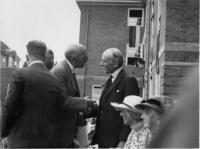Salisbury's own seven-page summary of the weekend began with a list of those present.* Then he went on: 'I think it may be said broadly that the Group leaders made a profound impression upon those who had come to meet them, and the general conclusion appeared to be that a great force had become revealed which assuredly had to be reckoned with. I do not think there was anything in the Notes made after the Bournemouth House Party* which seemed to be in need of correction, but the following points should be noted as specially emerging from the Conference. There was abundant testimony by the Group speakers as to the results in their own lives which had been effected by the Group teaching - the peace, happiness and vigour which had followed. Similarly, in describing their experience of others who had been brought under the influence of the Group, they showed how friction in domestic life, unrest between employer and employed, and violent antagonism in politics had been softened or swept away. Lastly, the impression left upon the audience at the Conference was that great numbers of people in Country after Country are waiting, almost panting, for a lead in things spiritual as the only hope to enable Society to stand up against the moral and social degeneration of the time.'

(* 'The members of the Oxford Group consisted of: Lady Gowers, The Revd Cuthbert Bardsley, Dr Frank Buchman, Sir Philip Dundas, Mr Loudon Hamilton, Mr Kenaston Twitchell, The Revd Jack Winslow, M. Faure from France, Mr J. Roots, Mr Wilson and two others who came for the day on the 11th. They were met in conference by Caroline, Lady Bridgeman, Lady Gwendolen Cecil, Mrs Alfred Lyttelton, Mr R. H. Bernays MP, Sir John Cadman, Captain V. A. Cazalet MP, Lord Cecil, Sir John Davidson MP, Sir Francis Fremantle MP, Lord Goschen, Lord Grey, Lord Halifax, Lord Lytton, Lord Eustace Percy MP, Mr Francis Rodd, Lord Sankey, Lord Wolmer MP, besides Lord and Lady Salisbury.')
(* A thorough and appreciative summary of the Oxford Group principles he had written after his attendance there, of which I have a copy.)
'Group teaching' was discussed, including difficulties and criticisms regarding guidance, sharing, the meaning of change and the relation to institutional religion. 'But these criticisms', Salisbury concluded, 'do not seem to touch the essence of the Movement - a call to men and women including most professed Christians, for a vital, even a revolutionary change in their lives, namely, the acceptance in thought, word and deed of the immediate guidance of God as revealed in Christ and the recognition of a duty by sharing religious experience to help others to the same acceptance.'22 In a covering note to the Archbishop of Canterbury he concludes, 'I have certainly not overstated it in the case of many that they were profoundly impressed - perhaps all of them.'23
250
Photo: Lord Salisbury greets friends at the Oxford Group house-party in Oxford, 1935.
©Scoville Wishard/MRA Productions